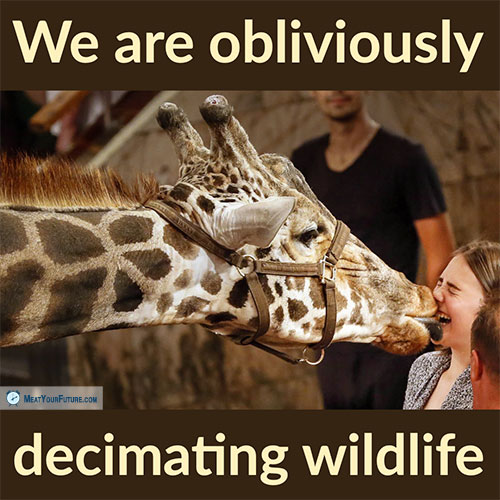|
We all love wild animals, like giraffes. When they are born in zoos, millions tune-in to watch livestreams of the babies taking their first steps. But, it turns out, we are decimating wild animals across the globe. Species that took millions of years to evolve are now rapidly going extinct, due entirely to our actions. For example, the giraffe population has declined by a staggering 40% in the last three decades, and are now labeled “vulnerable” to extinction. And, the World Wildlife Fund (WWF) reported that, since 1970, we have lost more than 50% of all wildlife on Earth. *** Let that sink in — OVER ONE-HALF OF ALL WILDLIFE ON EARTH VANISHED IN JUST ~40 YEARS. *** Over that same period, our human population more than doubled — from 3.7 billion to 7.6 billion today. We can’t ignore the increased pressure our growing human population has on the environment and other species. Of course, the fact that most humans also consume animal foods, the production of which has an enormously unsustainable footprint and is wrecking immense ecological havoc, makes the entire situation substantially more dire. Animal agriculture is (BY FAR) the largest anthropogenic user of land on the planet, which results in it also being the major driver of deforestation. Animal agriculture uses a staggering 45% of the land surface of the planet, per the International Livestock Research Institute. This, in turn, results in many species losing their habitats, further driving the current rapid loss of biodiversity (with our time already being labeled by scientists as the “Sixth Mass Extinction”). In addition to considering the benefits of smaller families, please recognize that being vegan is easy, healthy and one of the most urgently needed actions you can take as an individual to protect the environment and other species (both wild animals and the billions of other animals who are needless killed every year for foods we do not need). *[Further resources/links to come]. |
